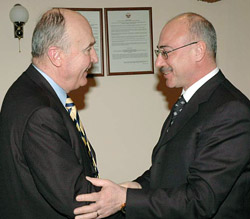Today the French co-chair of the OSCE Minsk Group, Bernard Fasier is leaving for Geneva from Yerevan, where he is going to meet with his American and Russian colleagues.
Tomorrow the co-chairmen will meet with the Azeri and Armenian foreign affairs ministers as well. The meeting in Geneva was the reason why Mr. Fasier visited the region. Mr. Fasier visited Yerevan first, later he left fro Baku from Yerevan and returned back to Yerevan again. Mr. Fasier met with the presidents and foreign affairs ministers of Azerbaijan and Armenia. Yesterday Mr. Fasier gave an interview, where he said that those meetings were “positive and constructive”. Concerning the negotiations Mr. Fasier said that they were discussing the issue of returning refugees. He also said that the recommendations to the issue were not logical much while that issue was very “sensitive”. “That issue should be discussed more seriously” said the French co-chairman of the OSCE MG. Mr. Fasier says that the process of returning refugees to their places of living should start from the regions where there will be fewer problems. He says that it is very difficult to discuss the issue of returning refugees “to those territories where the Azeri people were majority”. Besides that Mr. Fasier says that in order to return them to those regions certain conditions of living should be created such as electricity, schools and other institutions. Mr. Fasier thinks that it is not enough and the parties should also lobby among the citizens that they should live together. “It is impossible to start building a house from the roof” concluded Mr. Fasier.
Mr. Fasier said that he spoke in the name of the other co-chairmen too and the reason he visited the region alone was their working graphic. During the press conference that lasted over one hour Mr. Fasier answered to several questions only since he was speaking slowly and he didn’t inform any new details concerning the negotiations. Mr. Fasier said that if the meeting of the foreign affairs ministers in Geneva were effective, the ministers would meet several times more, and if those meetings were effective too, the presidents might meet too. Notwithstanding, the presidents will not meet before the upcoming parliamentary elections. Meanwhile, Mr. Fasier said that he hoped the meeting of the presidents would be constructive and the document named “Main principles” would be “formalized”. However, if the meeting of the presidents is not constructive, the MG will continue its intermediary mission. The French co-chairman says that this meeting of the foreign affairs ministers is the continuation of the previous meetings and does not include any new offers and ideas. Mr. Fasier says that the format of negotiations or its institution should not be changed (the proposal of GUAM concerning frozen conflicts in the Post-Soviet states). Mr. Fasier says that conflicts are not alike and each of them should be discussed in consideration of the specific factors they have. He also does not agree with comparing the conflict of Karabakh with Kosovo. Mr. Fasier says that the problem of Kosovo is a problem of one state, where there are international peacekeepers too, notwithstanding there aren’t peacekeeping troops in Karabakh and the conflict is between two states (Armenia and Azerbaijan). The French co-chairman often pointed out the fact that the conflict is between two countries (it means that Karabakh is a conflict and disputable territory between the two states). Answering to a question that in the past Karabakh was a participant of the process of negotiations and it should be included in that process again Mr. Fasier said that when time comes it will be impossible to solve the problem without considering what the people living on that territory think. Later Mr. Fasier said the following: “The fact that the representatives of Karabakh don’t participate in the negotiations is not the decision of the MG, I know that before they participated in the process of negotiations, but that practice was changed before I became co-chairman”. In fact, Mr. Fasier “hinted” that it was Armenia’s fault (but not due to the co-chairmen). To note, the mentioned practice was changed in 1998, when the Armenian authorities declared that they were going to represent the interests of Karabakh during the negotiations. Later when they understood their fault, Karabakh was already left out of the process of negotiations. Now, when Armenia is trying to recover the place of Karabakh in negotiations, they remind us that it was our own decision and say that they will consider what the Karabakhi people think when defining the status of Karabakh.

